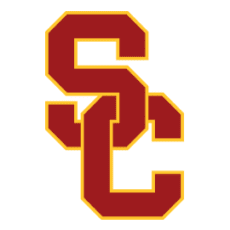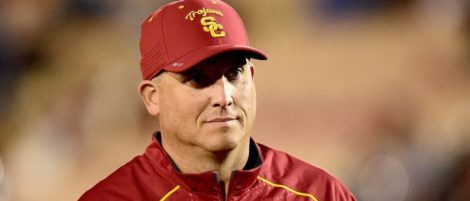George Floyd’s murder led recruits to question coaches. The answers have helped USC
At the close of his sophomore year at Santa Ana Mater Dei, all of the nation’s big-time college programs were circling the top cornerback in the 2022 recruiting class. What none of his suitors could have known then was how the murder of George Floyd by a police officer on May 25, 2020, in Minneapolis would end up altering their pursuit of a player who lived in Southern California.
The nationwide protest that defined the pandemic summer would find its way into the living rooms of the Los Angeles area’s top young football players. Two weeks after Floyd’s death, Ceyair Wright (below), a coveted cornerback prospect in this year’s class, reached out to Jackson and 16 other Southland recruits about participating in a video that told the world how they felt about police brutality and racial injustice.
On June 18, the players posted the video on social media.
“We can’t ever be the same,” Jackson said.
When the group released their video, college football players spurred by Floyd‘s murder already were turning into activists for the first time, challenging their coaches not just to listen but to change. As groundbreaking as that was, a bunch of high school kids finding their voices together while they still held the power in the dynamic with college coaches — I can choose to play for you … or not — was earthshaking.
“This is going to revolutionize recruiting,” Paul Finebaum, a radio host who daily commands college football’s zeitgeist from the Southeast perspective, predicted to The Times last June. “This is the embryonic stage of a movement that very well could change this sport for the next generation. … The great debate now is going to exist out there: Who is going to be able to adapt? What coaches are capable of this?”
There has been only a year to assess the impact of Floyd’s murder and Black Lives Matter on the makeup of college football rosters, but there are telling data points. Among the 14 members of the Class of 2021 who participated in Wright’s video, 11 chose to stay in the Pac-12, including seven who signed with USC (thanks in large part to CB coach Donte Williams), which had been struggling in recent years to lock down local talent.
Starting June 1, programs can welcome 2022 recruits to campus for the first time since the pandemic began, which will put to the test five-star CB Domani Jackson’s USC commitment.
Jackson has a June 17 visit scheduled at Alabama, which will not go down quietly when it comes to the No. 4 overall recruit in the 2022 class according to the 247 Sports Composite Rankings. It’s wild to think that Nick Saban’s dynasty and NFL riches factory will be at a competitive disadvantage in any recruitment, but there are certain variables that are out of the legendary coach’s control in the aftermath of the Floyd protests — like the school’s location in the heart of Dixie.
“Racism is something he’s never really been exposed to,” says Randy Jackson, Domani’s father and a retired Marine.
“That is going to play a part in it, to see how comfortable Domani feels, not necessarily on campus but the surrounding areas. We haven’t lived in the South. We know as far as going to SC, it’s very diverse, so that’s not a major issue. But in the South, diversity can be a little different.”
Among the 14 members of the Class of 2021 who participated in Wright’s video, 11 chose to stay in the Pac-12, including seven who signed with USC
Wright, who chose USC in January, did not include any Southern schools among his finalists. It wasn’t a coincidence.
“If I was at a school where they’re not on the side that I am as far as social injustices, those are things that are probably immediate deal breakers,” Wright says. “I think watching coaches’ interviews and reading the team statements, you can start to figure out where people stand.”
Yes, today’s recruits really are watching, now fully aware of their agency and the weight of their choices to reward coaches whose actions align with their words.
Last summer, it quickly became the expectation that coaches would say something on behalf of their programs on social media. Some coaches, however, seemed like they were going out of their way to send contrary messages, like Clemson’s Dabo Swinney, who wore a shirt that said “Football matters” during the heart of Black Lives Matter protests. Oklahoma State coach Mike Gundy posted a photo of himself wearing a shirt featuring the logo of the far-right One America News Network. The Cowboys’ star running back, Chuba Hubbard, publicly called out his coach, which prompted a Gundy apology.
Other coaches reacted with a supportive message. Washington coach Jimmy Lake was among the first to weigh in.
Ceyair Wright — If I was at a school where they’re not on the side that I am as far as social injustices, those are things that are probably immediate deal breakers.”
“I remember poring over what I wanted to say, lying in bed late at night, trying to get the words together,” says Lake, who is of mixed race.
Given stringent pandemic protocols, there was a limit to what Lake could do for his players. He couldn’t see them in person, much less hug them. He decided the first course of action was to register every Husky player to vote in last year’s election, a mission Washington accomplished.
“We don’t want this to happen to anybody ever again, for that police officer to get into that position that he’s in, that he was allowed to have his job,” Lake said. “What I came up with is, we need to educate our players on how to vote. Not just at the presidential level, but at the local level. That’s direct change to your community.”
“That was a real strong indication of what positive change is,” Cristobal says. “People are going to feel upset, angry, frustrated, but how does it turn into positive change?”
“With Zoom, what it really provided us, we could have everyone in our organization be a part of it, and all of a sudden, you see all these faces in the boxes all at one time,” Edwards says. “You look at these people and you realize, ‘Wow, that’s a diverse group of people.’ And it’s kind of shocking for some of [the recruits] when they see it.”
Top 2022 wide receiver Larry Turner-Gooden, one of the young Southern Californians who spoke out in the video last summer, committed to Arizona State over Alabama and others. He plans to visit the Crimson Tide, but, as with Jackson, Saban and his staff have an uphill climb.
“You’ve got a more African American coaching staff over there at Arizona State,” says Turner-Gooden, who attends Playa del Rey St. Bernard High. “That was a huge part too. I feel when I’m at ASU, I’m comfortable. If I were to get into some situation [with police], I know that the coaching staff would back me up. They already know how it’s going to go and how it’s going to look.”
“Domani sees Donte as an older version of himself,” Randy Jackson says.
“Donte is hard to say no to,” says Rashad Davis, the father of Raesjon Davis.
Rashad paid attention as college football programs reacted to Floyd’s murder and did not come away convinced of coaches’ authenticity.
“Kind of fake,” he said. “I just think a lot of coaches should be more involved with the kids and where they come from. It would make things easier for parents sending their kids off somewhere. You might know the coach, you might not. He may show you a certain way when he is recruiting you, but once your kid signs that piece of paper, he’s a completely different person.”
It wasn’t anything against LSU, but Raesjon decided USC was the better fit. The Trojans have benefited more than any program from the changing priorities of the last year, and they are hoping to harness that momentum.
Football could wait.
__________

